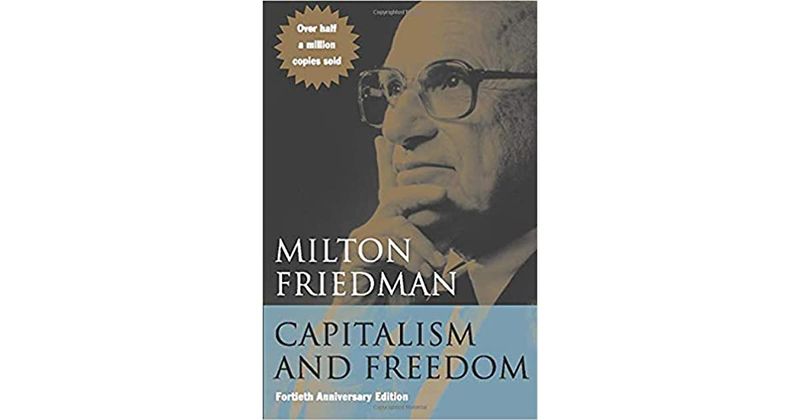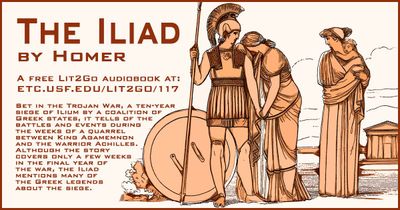A Critic's Meta Review: 4/5
Milton Friedman’s Capitalism and Freedom (1962) is an overview of some of the ideas that made Friedman one of the most influential economists in history.
Although John F. Kennedy’s 1961 call to the American people, “Ask not what your country can do for you, ask what you can do for your country,” was one of the most famous messages of the decade, it was also bad advice. Americans should neither look to the government to provide for them, nor seek out ways to provide for the government, but to find ways to use the government to create opportunities for themselves. For people to act in this way, they have to be free. Achieving freedom for its people should be the ultimate goal of any society. But to be free, a society’s economy has to be organized by a market made of buyers and sellers acting according to their own desires. In such an economy, people have freedom because no one person or entity can coerce another person to act in a particular way. Such an arrangement is the essence of liberalism in the original sense of the word.
Liberal capitalism is an essential precondition for political freedom. Within a free society, government has a narrow, but essential role to play. The government writes laws that allow the market to operate without hindrance, such as laws concerning private property, and enforces those laws equally among everyone.
A free market is the basis of all human freedom. By understanding the role of the government in guaranteeing that freedom, people in the United States and other supposedly free countries can begin to come to terms with the ways their governments have vastly overextended roles in those societies. In some cases, such as education, the government has nationalized an area of society that should exist entirely in the private sector. In other areas, such as taxation, the government has burdened individuals and businesses with overly complex and unnecessary rules. To create true freedom in society, people must recognize these areas of needless government intervention and transfer them to private control.
Capitalism is a necessary precondition for political freedom.
Although not all capitalist societies exhibit political freedom, all societies with political freedom organize their economies through liberal capitalism. Economic freedom precedes political freedom. Accordingly, political freedom cannot be separated from economic freedom.
Just as a free economic system supports a free political system, free political institutions enable a free economy, as many successful nations throughout history have demonstrated. As Daron Acemoglu and James A. Robinson discuss in their bestselling book Why Nations Fail: The Origins of Power, Prosperity, and Poverty (2012), the Southern African nation of Botswana set itself up for economic success when it became independent in 1966 because it established inclusive political institutions. While the government was strong and centralized, it also recognized the authority of tribal leaders. At the same time, the government ensured those tribal leaders were accountable by maintaining assemblies in each district where adult men could verbally challenge the chieftain’s agenda, and even vote to overrule it. By the time the country began exploiting diamonds in the 1970s, wealth poured into Botswana. But whereas leaders in other African countries hoarded mineral wealth themselves, Botswana’s leaders invested the proceeds in public goods, like infrastructure and education, giving the people less reason to revolt, and strengthening the economic foundations of the country. Decades after independence, Botswana remains both stable and prosperous—a rarity on the African continent.
There are a number of monopolies in the United States, some of which exist by government decree. Most of these monopolies have no economic justification whatsoever.
There are some areas of society in which the government should maintain a monopoly on the distribution of resources because it is impossible for everyone to have their own prerogatives and outcomes. For example, two people from the same country cannot have their own forms of national defense. But in sectors where private competition is possible, government-sanctioned monopolies are completely unwarranted. Markets allow for resources to be truly distributed proportionally based on people’s need, whereas government distribution channels require laws that apply equally to all people, regardless of their need. Accordingly, when people are subjected to government monopolies, they are coerced into accepting resources they may not desire.
As expanding Americans’ access to broadband internet has become a greater area of concern for policymakers, some advocates have said government agencies should act as a low-cost broadband provider. Few people have said government broadband providers should be the only provider in any market. But, writing in Forbes, Steve Pociask, president of the American Consumer Institute, a non-profit research group, argues that if private broadband providers had to compete with government providers, the result would be a de facto government monopoly. Pociask points out that, because public broadband companies would not have to account for profits or maintain good business practices to attract and retain customers, they would enjoy artificial advantages over their private competitors. Pociask adds that the scenario is akin to a person opening a restaurant where the “main competition was a government-run cafe whose costs and entry barriers were artificially lower.” Knowing the market was rigged against them, private broadband providers would surely leave the market entirely, leaving consumers to suffer under government broadband, which would then collapse into poor service, higher-than-necessary prices, and other ills. Despite industry opposition, however, public interventions in communications networks have been on the rise across the United States in recent years, largely to create alternatives to de facto monopolies run by some private broadband providers in some areas, such as Comcast. As of January 2018, almost 200 communities around the country can claim a publicly owned fiber-optic network, available to at least some residents.
While governments should have some control over monetary policy, it is important to give this power to the government without giving it undue control over the economy.
When the government repeatedly tries to fix the economy by adjusting interest rates, it risks doing more harm than good. Instead of making periodic interventions, the Fed should follow a simple rule: maintain a 3-5 percent annual increase in the overall supply of money.
In the 1990s, under Federal Reserve Chairman Alan Greenspan, the Fed rarely made changes to interest rates. Although this was not official policy during this time, the Fed’s minimalist approach closely resembled a prescription for Fed action proposed by economist John Taylor in 1993, called the “Taylor Rule.” According to the rule, the Fed should maintain high interest rates when inflation is above the target set by the Fed Board, or when employment levels are especially high. When inflation is below the Fed’s target, and the economy is not at full employment, the Fed should lower interest rates.
Completely free trade between countries would do more to help both poor countries and wealthy countries than government aid programs.
When governments burden the economy with trade restrictions, like tariffs, purely to protect jobs in their own countries, they restrict free enterprise at home and abroad. Moreover, attempting to uplift poor countries with highly restrictive government aid programs only hinders their economies by dictating what they can and cannot produce by government decree, without acknowledging the needs or demands of the market. A liberal approach compels countries to adopt completely free trade, allowing all countries to produce, buy, and sell as they choose.
Bill Easterly is an American economist in the liberal tradition, and a longstanding critic of foreign aid programs in poor countries. Restating many of the themes of his work in an essay in Foreign Policy, he argued that economists and development practitioners who professed to know the best solutions to poor African countries’ most dire problems were doomed to fail. Moreover, he wrote, development practitioners followed a disastrous legacy of central planning in the last century. He wrote, “Those who best understood the lessons of the twentieth century were not the ideologues who asked ‘what is to be done?’ (a reference to one of Soviet leader Vladimir Lenin’s most famous essays). They were those asking ‘How can people be more free to find their own solutions?’” Instead of applying complex technical solutions to the problems of poverty, such as classes intended to change the behaviors of poor people, Easterly continued, economists should help poor countries leverage “time-tested economic ideas,” such as trade and economic specialization.
Trying to grow the economy through government spending is foolhardy and counterproductive.
Since the New Deal programs of the 1930s, economists and policymakers have claimed that expanding the size and spending of the government is necessary to keep unemployment low. This idea, which was popularized by British economist John Maynard Keynes, is consistent with greater economic instability, not greater stability, as Keynes claimed. When determining spending allocations for the year, governments should only consider what services people want the government to provide and pay for themselves, regardless of employment levels.
In the wake of the 2008 recession, the Chinese government responded with a massive package of government spending, but within a few years, the effort was showing signs of backfiring. Writing in Fortune in December 2016, Chris Matthews noted that the Shanghai stock market had fallen more than 20 percent since the month before, and economists were scaling back their previously rosy predictions for the nation’s economy. The reason, Matthews argued, was that China’s stimulus package, like prior attempts to alleviate economic disasters in Brazil and Japan, had provided some temporary relief at the cost of distorting the economy. China, like Brazil in the 1970s and Japan in the 1980s, had taken measures to artificially stimulate the economy, such as depreciating its currency to make exports cheaper on foreign markets, and putting caps on interest rates to flood financial markets with cheap loans. Matthews writes, “Such policies make it profitable for businesses to invest, even when these investments don’t make economic sense.” [9] After a surge of economic activity, these countries all had to endure a long period of stagnation while the economy ameliorated some of the distortions stimulus had caused. [10] Two years later, the Chinese economy continues to struggle, as an increasing number of businesses default on their loans and Chinese stocks stagnate.
School vouchers, or credits which parents could apply to their child’s private education, would be a more effective way to educate children than a comprehensive public school system.
Even in free societies, the government is so often assumed to be the best provider of educational services that people typically forget there is no liberal justification for government having such an involved role. Instead of the government providing elementary, middle, and high school educational services directly and at taxpayer expense, the government should compel families to pay for their children’s education at private institutions themselves. For those families who could not afford this burden, the government should use taxpayer resources to subsidize them.
School vouchers have won supporters from successive Republican presidents, who have dubbed the reform “school choice.” Most recently, President Donald Trump and Secretary of Education Betsy DeVos have pressed for a nationwide program similar to one deployed in Florida, which uses tax breaks to encourage donations for vouchers. If enacted, people and corporations could donate to designated organizations which provided vouchers to K-12 students. Taxpayers would get a substantial write-off, and children, mostly from low-income families, would get the money they needed to attend a private school of their parents’ choice. While pro-voucher education groups have hailed the proposal, it has stalled so far because of a lack of bipartisan support in Congress.
Free markets are more effective than laws at countering discrimination.
In a capitalist society, businesses that do not discriminate based on demographic factors like race or gender will always have access to more employees and customers. As a result, such businesses will always have an advantage over businesses that discriminate. This is why capitalism is inherently capable of countering discrimination, and why societies which facilitate competition exhibit less discrimination than societies which do not. But when governments attempt to reduce discrimination through laws, they only inhibit the ability of businesses to hire and fire who they want based on the criteria that they choose themselves.
Even in South Africa under apartheid, where businesses were required by law to discriminate against non-whites, competitive industry proved to be incompatible with racial favoritism. As economist and Friedman acolyte Thomas Sowell notes in his book Discrimination and Disparities (2018), companies in South Africa’s most competitive industries, such as the construction industry, typically hired and promoted more black employees under apartheid than they were permitted by law. In some industries, black employees actually outnumbered white employees in professions where companies were not allowed to hire black employees in the first place. These employers did not simply have a more progressive outlook on race than legislators, Sowell writes. Rather, the competitiveness of their industries compelled them to defy a cumbersome law in order to stay in business.
Businesses should not hinder their own pursuit of profits by pursuing an agenda of social responsibility.
Some pundits have argued that businesses have a responsibility to society beyond making profits. But in a liberal society, the only responsibility of businesses is to generate profits for shareholders. By acting on their greed and generating money, businesses can do more to improve society than they could by acting on a charitable agenda or donating to charitable causes.
Some academics and business leaders have argued that corporate social responsibility (CSR) and shareholder maximization are compatible. However, a 2017 study by Avishek Bhandari and David Javakhadze of Florida Atlantic University’s School of Business found that pursuing a CSR agenda reduces corporate profits. One reason is that, by allocating funds to social projects, a company simply reduces the money available to invest in its own business. Secondly, a company’s leaders may see CSR as a useful place to concentrate their efforts, along with, or even instead of, the company’s profit-generating activities.
As Javakhadze said in a press release, “We found that emphasizing Corporate Social Responsibility is not good for shareholders.” He added, “If you’re an investor you should think twice before you invest in those firms that emphasize CSR.”
Professional licensing systems have no economic justification and should be abolished.
Professional licensing systems allow professional groups, like doctors, to prevent rivals from joining their ranks while facilitating a cartel of professionals to dominate their industry. If licensing systems were abolished, the result would be better, and less expensive service for consumers.
Writing in The New York Times Economix blog in 2013, economist Uwe Reinhardt discussed how a debate in California captured the essential tension between the desires of professional groups to protect their interests and the needs of patients. At issue was a proposed law which would have allowed qualified nurses to work in particular practice areas without the supervision of a licensed doctor. The law would have allowed nurses to provide their services more freely, at a time when California was facing a dire shortage of medical professionals. However, after the California Medical Association (CMA), a doctors’ group, opposed the bill, saying that it would expand access only by creating a “second tier of health care” which “offers lower cost in exchange for poorer quality,” a weaker version of the bill passed. Yet, as Reinhardt points out, in California at the time, about half of all physicians refused to accept Medicaid, a government health insurance program for low-income people. By opposing a “second tier” for health care, Reinhardt argued, the CMA would leave poorer patients with two bad options: health care for more than they could afford, or no health care at all.
A flat tax would be more fair and equitable than the existing tax system.
By attempting to make the tax system fair through a progressive tax, the government has only made taxation complicated. With so many loopholes, businesses with lawyers and accountants to prepare their taxes can exploit those gaps to ensure they have a low tax bill, ensuring the nation’s tax burden is disproportionately covered by poorer people. A flat tax would eliminate these complications and make the entire system fairer.
The enormous complexity of the American tax system is also a burden on Americans’ time, and, by extension, their productivity in the economy. According to a 2017 report by the conservative think tank American Action Forum (AAF), Americans spent a combined 8.1 billion hours on tax paperwork, or 54 hours per taxpayer in 2016. According to the AAF’s calculations, this time spent filling out paperwork constituted a $170 billion burden on the US economy. Since their tax forms are especially numerous and complicated, small businesses are one of the most heavily burdened groups, spending 275 hours per year, on average, filling out tax forms, according to AAF’s calculations.
Programs for redistributing wealth from the young to the old, such as Social Security in the United States, impose a significant cost on people for minimal gain.
Under a program like Social Security, everyone pays, and everyone is entitled to a benefit. As a result, even people who have contributed little to nothing to the system can receive benefits, when many of them are well-off and do not need the extra assistance. Yet while the benefits are uneven, the cost is endured by everyone.
Writing in 2014, Boston University economist Larry Kotlikoff noted that the rules for Social Security death benefits allow for some “egregious inequalities.” [20] For instance, divorce can complicate the distribution scheme. Under the current system, Kotlikoff notes, a divorced person who was married for 10 years could receive survivor benefits based on their ex-spouse’s contributions, but someone who officially ended their marriage one day short of a decade would see no benefits at all.
To reduce poverty, the government should create a negative income tax, so that everyone with income below a certain threshold would receive a subsidy instead of paying taxes.
Instead of employing a patchwork of different and largely ineffective programs to assist the poor, taxpayers, through the government, should provide direct cash benefits to poor people. Doing so would raise the floor of everyone’s income, ensuring that no one fell below it, regardless of their profession or social standing.
In recent years, the idea of a universal basic income has become more popular among researchers on both sides of the political spectrum. In a 2017 policy brief, Michael Tanner, a senior fellow at the conservative Cato Institute, wrote that studies on the subject from outside the United States show that giving people a basic income “can lead to important behavioral changes” in addition to providing a safety net in times of need. A basic income provides poor people with financial support while they search for jobs, he wrote. It also allows people to collect assets that are economically useful or which generate income, and hold onto them instead of selling them off in times of financial desperation. With a basic income, recipients have even been shown to make investments, creating new income streams for themselves.






